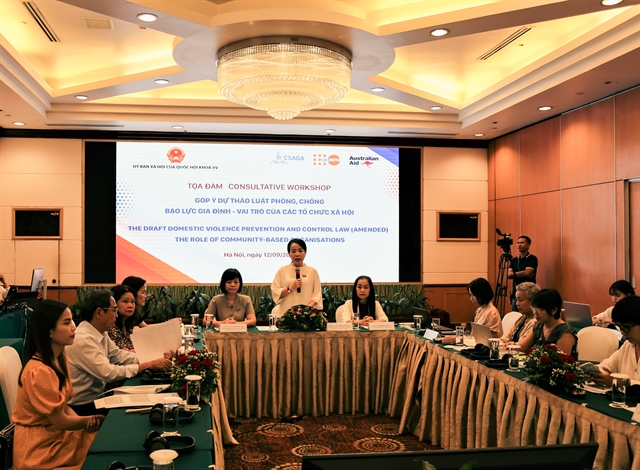 Society
Society


|
| Representatives from social and community-based organisations share with the National Assembly deputies ways to address domestic violence. Photo Courtesy of UNFPA |
HÀ NỘI - The latest draft of the Law on Domestic Violence Prevention and Control is based on a human rights approach, incorporating international lessons and good practices, said the United Nations Population Fund (UNFPA) Representative for Việt Nam, Naomi Kitahara.
Speaking at a workshop on Monday, Kitahara said that UNFPA recommended strengthening the effectiveness of state institutions while creating favourable conditions for community-based and non-governmental organisations to contribute to implementing policies and programmatic interventions to tackle domestic violence in Việt Nam.
"The survivor–centred approach has been applied to ensure the rights of domestic violence survivors, and their needs and voices have been taken seriously. This was important, especially in the context of Việt Nam where violence against women is mostly hidden," she said.
The workshop, held by the National Assembly's Committee for Social Affairs in collaboration with the Centre for Studies and Applied Sciences in Gender – Family – Women and Adolescents (CSAGA), attracted representatives from social and community-based organisations. They shared with the National Assembly deputies their activities in addressing domestic violence and discussed mechanisms to join forces in tackling domestic violence for Việt Nam.
The current Law on Domestic Violence Prevention and Control was approved by the 12th National Assembly on November 21, 2007, and took effect on July 1, 2008. However, the National Study on violence against women in Việt Nam in 2019, conducted by the country's General Statistical Office and MOLISA, with support from Australia and UNFPA, showed little change in violence against women since the 1st study in 2010.
In particular, 62.9 per cent of women in Việt Nam experienced at least one form of physical, economic, emotional, and/or sexual violence and controlling behaviours in their lifetime. In addition, 90.4 per cent of survivors of violence did not seek help from authorities, while half never told anyone about the violence. Thus, domestic violence is hidden in society, and it is an alarming issue.
In this context, it is high time to strengthen the 2007 Law. Since October 2021, when the first draft of the Domestic Violence Prevention and Control Law was released for feedback from the public, many technical meetings and consultative workshops have been organised by the Ministry of Culture, Sports and Tourism to discuss options, share experiences with other countries, and debate the best alternative to take for Việt Nam.
The amendment also focused on providing essential and integrated services for domestic violence survivors. It requests the relevant stakeholders pay further attention and provide financial and technical resources during the law's implementation.
After the proposed amended law was elaborated during the 3rd plenary session of the 15th National Assembly in June, the Ministry of Culture, Sports and Tourism and National Assembly Committee for Social Affairs incorporated all the feedback and comments and finalised the latest draft version with 56 articles.
UNFPA has been working very closely with the ministry during the revision process, providing technical and financial support to incorporate recommendations from different studies and ensure international standards and commitments on preventing and responding to domestic violence.
Addressing the workshop, Nguyễn Thị Kim Thúy, Vice Chairwoman of the National Assembly's Committee for Social Affairs, said that the information and experience shared at the workshop included international experience and best practices in addressing domestic violence, especially from Australia. The highlight of the mechanisms of engaging social organisations in delivering services, the development of specialist courts for domestic violence, and the evidence-based policy development were useful to Việt Nam.
Nguyễn Vân Anh, Founding Chairwoman and Director of CSAGA, said that she was honoured to join the discussion during the 2007 Law on Domestic Violence Prevention and Control development as a representative of social organisations. Now, she was able to contribute to the amendment of the law.
"In the past 15 years, social organisations and non-governmental organisations made many positive contributions to the Government's efforts to end domestic violence. With the revision of the current law, favourable conditions can be created for social and community-based organisations to be fully engaged in the Government's programmes to prevent and control domestic violence," she said.
"We trust that our perspectives shared at the workshop will be considered and incorporated in the draft amended Law on Domestic Violence Prevention and Control to promote community-based activities in the coming years," she said.
The Law on Domestic Violence Prevention and Control (amended) is expected to be approved by the 15th NA at its 4th plenary session next month. VNS




